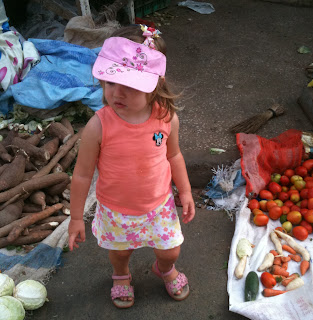Living in a Fish Bowl
Have you ever been in a place where you stand out from the
crowd? My friends who as minorities grew
up in an all white town or school can probably remember times when they felt
like they stuck out like a sore thumb.
Yet, I imagine that, most of the time, people weren’t pointing and
crying out, “Look at the Asian guy!” Or, “Hey, there’s a black girl!” Well, let me tell you, in Senegal, rarely does a day
goes by (when we go out in public) that that doesn’t happen to us! Usually these cat calls come from children, who call us “toubab” (pronounced TWO-bob), which simply means white person in Wolof, and as far as I know, it's not pejorative.
Our challenge as Westerners isn't so much how to respond to such remarks from kids, since they can be easily ignored. What's tough is knowing that everywhere we go, we're being watched, and lots of people around town know who we are, even if we don't know them. And they're taking mental note of any behaviour on our part that may be deemed offensive, whether intentional or not. This could be as innocent as failing to properly greet a vendor or as inappropriate as getting into a marital spat in public (I'm sure none of you ever do that!).
Living in a fish bowl like that can lead to one of two responses: 1. We can get bitter and frustrated and avoid going out in public as much as possible.
2. We can accept this reality and learn to see it in a positive light.
From time to time, during moments of culture stress, we've chosen option number one. But, by the grace of God, we've made it out of those ruts and have learned to take advantage of the opportunities provided by our unique position. For one thing, the kind of accountability provided by a complete lack of anonymity really keeps us on our toes and dependent on Christ. And, the truth is, God is watching every one of us and nothing we do escapes his attention, whether we live in Thiès or Toronto. Plus, we've found that, because we are guests in their country, the Senegalese are far more willing to hear us out when we speak of Christ (something that is not always the case for national believers). So, if our status as toubabs grants us a captive audience, then, you better believe these two toubabs are going to preach the gospel, baby!
Our challenge as Westerners isn't so much how to respond to such remarks from kids, since they can be easily ignored. What's tough is knowing that everywhere we go, we're being watched, and lots of people around town know who we are, even if we don't know them. And they're taking mental note of any behaviour on our part that may be deemed offensive, whether intentional or not. This could be as innocent as failing to properly greet a vendor or as inappropriate as getting into a marital spat in public (I'm sure none of you ever do that!).
 |
| Our cutie at the local market, getting lots of attention from the veggie ladies |
2. We can accept this reality and learn to see it in a positive light.
From time to time, during moments of culture stress, we've chosen option number one. But, by the grace of God, we've made it out of those ruts and have learned to take advantage of the opportunities provided by our unique position. For one thing, the kind of accountability provided by a complete lack of anonymity really keeps us on our toes and dependent on Christ. And, the truth is, God is watching every one of us and nothing we do escapes his attention, whether we live in Thiès or Toronto. Plus, we've found that, because we are guests in their country, the Senegalese are far more willing to hear us out when we speak of Christ (something that is not always the case for national believers). So, if our status as toubabs grants us a captive audience, then, you better believe these two toubabs are going to preach the gospel, baby!


In case you're wondering, although in the US, as a Latina, I would be considered "brown," in Senegal, I'm considered lily white! I've evern heard of Black Americans being called toubabs, since they are culturally far more like white people than like Africans in the eyes of the Senegalese. Interestingly enough, when it comes to Asians, they are not considered toubabs, but are all assumed to be Chinese, despite the fairly high population of Korean merchants and missionaries.
ReplyDelete